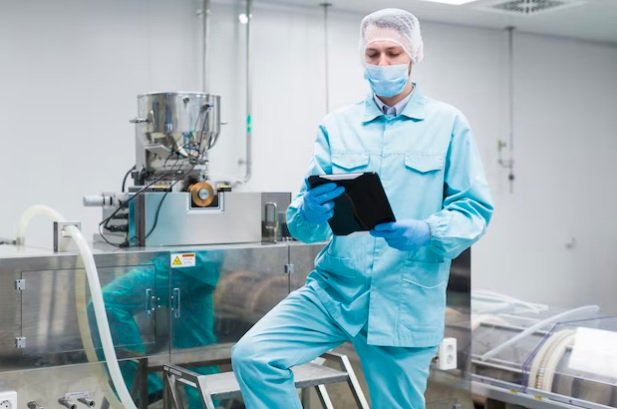Advanced Food Manufacturing Solutions for Optimal Production Efficiency

Elevate your production capabilities with advanced food manufacturing solutions. Achieve optimal efficiency and guarantee the highest quality output. Together, let’s transform your production processes!
Achieving optimal production efficiency is crucial in the food manufacturing sector. This focus on efficiency maximizes output, minimizes waste, and maintains high product quality. By enhancing efficiency, businesses can reduce costs, meet rising consumer demands sustainably, and increase profitability. Therefore, partnering with a decent solution provider for food manufacturing equipment can significantly contribute to achieving these goals. In a fast-paced market, maintaining a competitive edge is vital, and efficiency plays a significant role in strengthening that position.
There is a wide array of advanced food manufacturing solutions available today. These solutions include automated processing systems, smart manufacturing techniques, and innovative preservation methods. By embracing these technologies, companies can improve their efficiency, product quality, and overall sustainability in an ever-evolving industry.
The Need for Advanced Solutions in Food Manufacturing
Food manufacturing faces various challenges that require immediate attention. Rising raw material costs, stringent food safety regulations, supply chain disruptions, and the push for sustainable practices complicate operations. Additionally, the need to adapt to changing consumer preferences and stay abreast of technological advancements presents further hurdles for manufacturers in this critical industry.
As efficiency demands continue to rise, there is an increasing emphasis on streamlining processes and boosting productivity. Companies are focusing on innovative strategies and cutting-edge technologies to enhance operational effectiveness. This evolution is essential for meeting consumer expectations and fostering sustainable growth in an increasingly competitive landscape.
Key Advanced Food Manufacturing Technologies
The Role of FoodTech in Boosting Production Efficiency
In today’s fast-paced world, the demand for efficient, safe, and high-quality food production has reached new heights. Food manufacturing solutions encompass a broad spectrum of technologies, processes, and innovations designed to streamline operations while adhering to strict safety and quality standards. From automation systems that improve productivity to advanced preservation techniques that prolong shelf life without sacrificing flavor or nutrition, these solutions are essential for meeting both consumer expectations and regulatory requirements.
As global populations increase and dietary preferences evolve, food manufacturers must find sustainable methods to produce healthier products. Modern food manufacturing solutions provide tailored approaches that merge cutting-edge technology with best practices in supply chain management, waste reduction, ingredient sourcing, and sustainability initiatives.
Moreover, the digital revolution has ushered in a new era of data-driven insights, enabling manufacturers to optimize all aspects of their operations—from ingredient procurement to logistics management. This optimization enhances profitability while minimizing environmental impacts. In a landscape where innovation drives competition, exploring various food manufacturing solutions creates opportunities for businesses of all sizes, whether they are large-scale producers or small artisan brands seeking growth.
The Impact of Automation and Robotics on Efficiency
Automation and robotics are at the forefront of enhancing efficiency in food manufacturing. These technologies streamline processes, reduce human error, and increase production speed. By optimizing resource management and enabling precise task execution, automation allows human workers to focus on more creative and strategic roles, leading to significant cost savings across various industries.
Numerous case studies demonstrate the transformative effects of automation across diverse sectors. These studies reveal that organizations implementing automation technologies experience increased efficiency, lowered operational costs, and improved accuracy. This shift has reshaped the competitive landscape, allowing businesses to thrive in an evolving market.
The Role of the Internet of Things (IoT) in Enhancing Food Production
The Internet of Things (IoT) comprises interconnected devices that communicate and share data seamlessly. In food manufacturing, IoT enhances both efficiency and safety by monitoring processes, ensuring compliance with standards, tracking inventory in real-time, and improving supply chain transparency. This connectivity leads to better decision-making and optimized operations.
A case study showcases the advantages of IoT in increasing operational efficiency. By integrating smart sensors and connected devices, organizations can streamline processes, reduce downtime, and optimize resource management, driving productivity and enhancing overall performance.
AI and Machine Learning’s Contributions to Production Efficiency
Artificial intelligence (AI) and machine learning (ML) are revolutionizing the food manufacturing landscape. These technologies optimize processes, improve quality control, predict demand, and minimize waste. They provide real-time analytics that streamline operations, enhance supply chain management, personalize production according to consumer preferences, and improve safety standards through precise monitoring techniques.
The application of AI and ML is widespread across various industries, enhancing overall efficiency. For example, predictive maintenance in manufacturing, personalized recommendations in retail, and automated customer service chatbots all demonstrate how these technologies can transform operations and decision-making.
The Importance of Advanced Packaging for Efficiency
Advanced packaging solutions involve innovative techniques and materials that enhance the performance, efficiency, and reliability of food products. Techniques such as multi-chip integration and advanced substrate technologies improve thermal management and reduce overall footprint while optimizing functionality.
Effective packaging plays a crucial role in production efficiency. It protects products during transportation, optimizes handling and storage, and ultimately reduces waste. By allowing for faster distribution and improved inventory management, advanced packaging significantly contributes to overall productivity.
A case study illustrates the impact of advanced packaging technologies on product performance and market success. It highlights how innovative materials, enhanced designs, and sustainable practices improve shelf life, engage consumers, and reduce environmental impact across various industries.
The Future of Food Manufacturing
Emerging technologies are reshaping food manufacturing by enhancing efficiency and sustainability. Innovations like automation, artificial intelligence, and sustainable sourcing methods are transforming production processes, leading to higher quality, less waste, and improved responsiveness to consumer demands.
Looking ahead, we can anticipate that future advancements will further boost efficiency through cutting-edge technologies and automated processes. These innovations will streamline operations, eliminate redundancies, and encourage collaboration across sectors, ultimately driving productivity and enabling organizations to meet their goals more effectively.
FAQs About Food Manufacturing Solutions
What methods are used in food manufacturing?
Food manufacturing employs a variety of methods, including processing techniques like drying, fermentation, and freezing. Other approaches involve canning for preservation, mixing ingredients for consistency, baking to develop flavors and textures, and implementing quality control measures to ensure safety and regulatory compliance.
Can you give an example of food manufacturing?
One example of food manufacturing is the production of frozen pizzas. This process includes several stages, such as ingredient sourcing, dough preparation, topping assembly, cooking, and packaging, resulting in ready-to-eat meals available in grocery stores.
Is food manufacturing a profitable business?
Food manufacturing can be a lucrative venture, driven by the growing demand for convenience and diverse culinary options. Success in this field depends on factors such as quality control, efficient production processes, and the ability to adapt to market trends and consumer preferences.
How can we enhance quality in food manufacturing?
Improving quality in food manufacturing can be achieved by adopting stringent safety standards, investing in advanced technology, implementing regular employee training, fostering a culture of continuous improvement, and consistently assessing supply chain practices to ensure cleanliness and efficiency throughout the production process.



